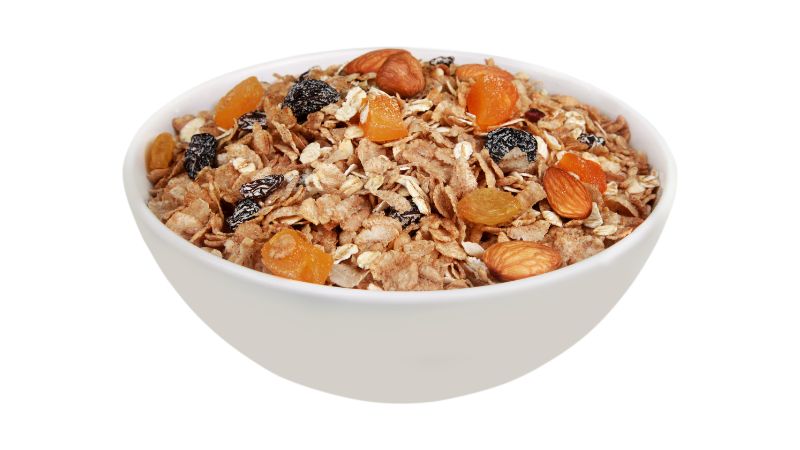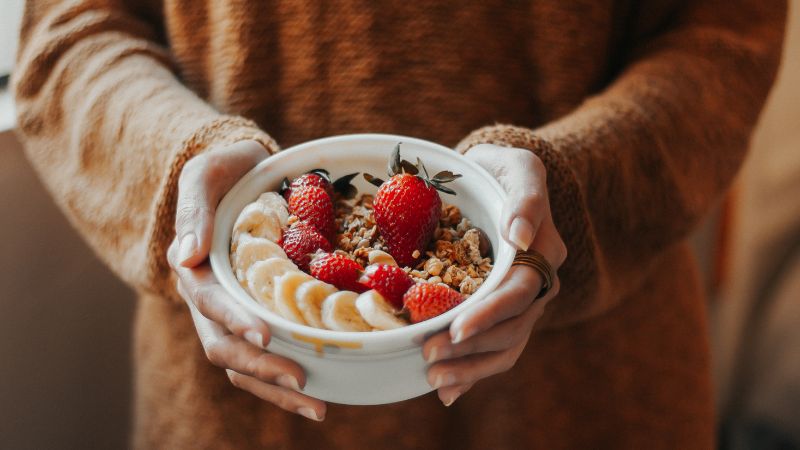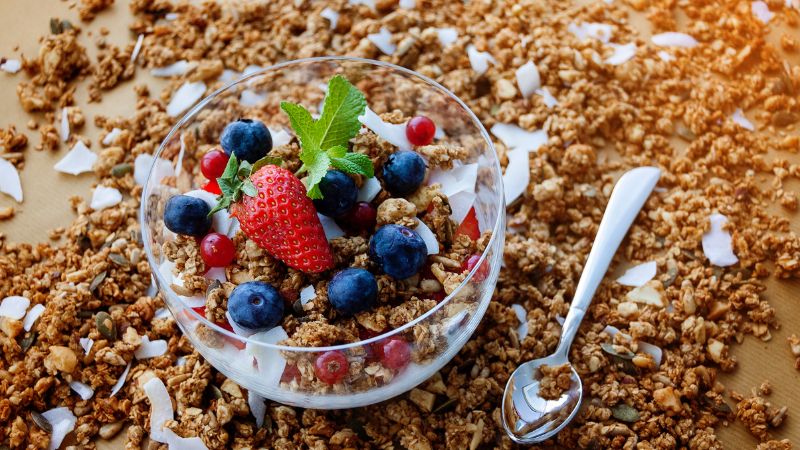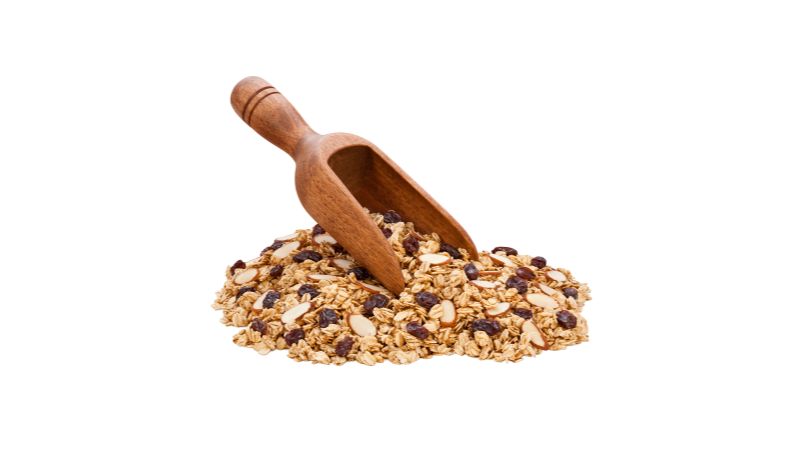
Can Dogs Eat Granola?
Facts, Tips, Recipes, and More
Humans can enjoy granola in so many ways. Sprinkle it on yoghurt or ice cream, or serve it with milk in the mornings. Pet owners undeniably want to provide a good life for their puppies. Could granola also be a healthy breakfast or snack choice for dogs?
Check out granola’s health benefits, recipes, and guidance.
How safe is granola for dogs?
Some types of granolas are considered safe for dogs to eat. However, others contain harmful ingredients that should be avoided.
Granola generally consists of rolled oats or puffed brown rice, which are not toxic to canines. Granola recipes often include raisins, nuts, and chocolate for flavour and natural sweetness. Dogs can generally eat granola if you carefully check the ingredients.
Is granola nutritionally beneficial for puppies?
Canine-safe granola provides your dog with these nutrients:
Calcium maintains a dog’s teeth, bones, nails, and coat. Boosting a dog’s nervous system is another benefit of calcium.
Potassium – is important for maintaining muscle function and improving blood flow. A low potassium level in your dog can affect its heart, nerves, and muscle functionality. Symptoms such as vomiting, paralysis, and lethargy indicate your dog isn’t getting enough potassium in his diet.
Fibre – Fibre ferments into fatty acids, preventing bad bacteria from growing. Additionally, fibre may reduce the risk of dogs developing colon cancer. Getting the right balance is important, as too much fibre can cause diarrhoea and digestive upset.
The essential amino acids in protein help your dog’s body function correctly. Protein helps to maintain healthy skin, coats, muscles, and repair, to name a few benefits.
Carbohydrates – Dogs need carbohydrates for energy. Canines’ bodies convert carbohydrates into heat and fat.
You shouldn’t replace your pup’s usual dog food with granola.
Avoid these harmful ingredients in granola
Granola can benefit dogs, but there are also some dangers to be aware of. Listed below are some that may be harmful to your dog if consumed.
Raisins – granola is commonly made with dried fruit to add natural sweetness. Raisins are dried grapes that are extremely poisonous to dogs. One raisin could be fatal to dogs. Consuming raisins can also cause acute kidney failure. Toxic ingestion symptoms in dogs include:
- Diarrhoea and vomiting
- tender Abdomen
- Lack of appetite
- Lack of hydration
- Excessive thirst and urination
Your pup may have ingested raisins. Emergency care is critical. Your pup’s survival could depend on it or not. Your veterinarian may recommend inducing vomiting, but you should only do so under the supervision of a medical professional. If your dog is experiencing shock or difficulty breathing, inducing vomiting is not recommended.
Chocolate – Chocolate granola contains theobromine, which makes it poisonous for dogs. Can you tell me why it is toxic to dogs?
And the caffeine in chocolate cannot be processed quickly by dogs, which results in toxic compounds building up inside the dog’s body.
As dark chocolate contains the highest levels of theobromine, it poses the greatest risk to canines. Granola recipes often contain dark chocolate because it is the healthiest for humans. The following are signs of chocolate toxicity:
- A seizure
- Tremors
- An irregular heartbeat
A dog consuming large amounts of chocolate should immediately be taken to the vet for advice.
Nuts – Some nuts are toxic to dogs. Granola commonly contains nuts, so you should know which can cause harm by checking the ingredients. Despite their dog-safe status, nuts such as peanuts and cashews are high in fat and salt.
Here are some nuts you shouldn’t give your pet:
Macadamia nuts – despite their unknown danger to dogs, even small quantities can cause serious harm to your best friend.
Almonds – Despite not being toxic, almonds cannot be digested by dogs, causing gastrointestinal problems. A dog could also choke on almonds if their large size and shape get stuck in its windpipe. Dogs should not consume almonds that contain seasoning or chocolate coatings.
A choking hazard and a blockage hazard
The owners of dogs know that their pets love to eat quickly. The small, hard chunks and pieces in granola can choke pups. Consumption of too many nuts and seeds could also cause a blockage in a dog’s body, which would require veterinary care.
A high level of sugar and fat
Adding too much sugar and fat to your dog’s diet can cause weight gain, cavities, diabetes, and heart disease.
Frequently Asked Questions
Do dogs eat granola bars?
There is a high amount of sugar in granola bars and other ingredients dogs shouldn’t consume, including raisins and chocolate.
Dogs can eat granola bars if they don’t contain toxic ingredients, but you should only do so occasionally because the sugar can cause diabetes and obesity. Granola bars made at home are a healthier and safer option.
Granola or peanut butter can dogs eat?
Peanut butter without chocolate or xylitol can be added to granola for your dog to enjoy.
Adding honey to granola in small quantities is also safe and can be a sweetener. It is known that honey has a very high sugar content and can lead to cavities and obesity if consumed regularly. The best thing you can do for your dog is to brush his teeth after he eats honey to keep them healthy.
Is granola safe for puppies?
Puppies’ digestive systems are particularly delicate while they are growing. As a result, granola fibre can cause diarrhoea. Dogs that are fully grown can still suffer from gastrointestinal upset. Even though granola won’t harm puppies long-term, it’s not recommended as a puppy diet.
Granola recipes for dogs
Making granola is simple, and many people prefer homemade to store-bought to limit the amount of sugar added.
Is cinnamon safe for dogs to eat?
It is good news that cinnamon is not toxic to dogs, though cinnamon essential oil can be harmful to pups. It is unlikely that your dog will suffer fatal toxic effects from too much cinnamon, but that does not mean you should sprinkle it on his food.
Oat dog treats rolled in oats
Treat your pup to these healthy, tasty treats.
Conclusion
Grass-fed oats and brown rice are the ingredients of granola. Most dog foods contain these carbohydrates as fillers and necessary carbohydrates to give your dog energy for the day. Fibre is the biggest risk for dogs when eating granola.





Leave a Reply